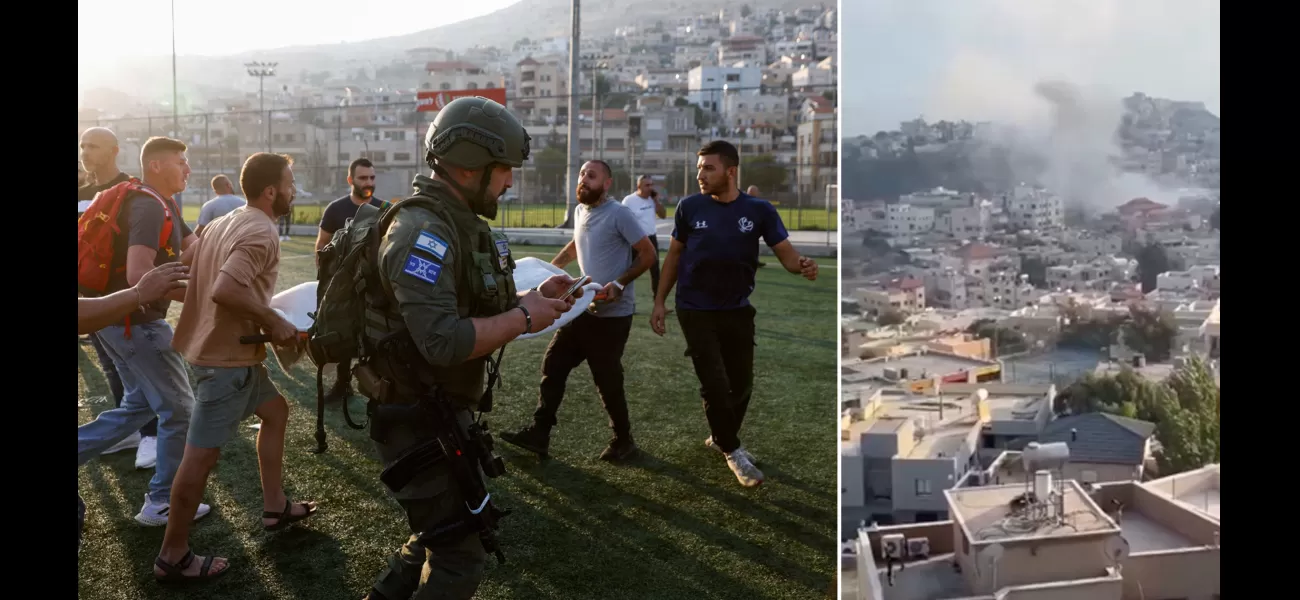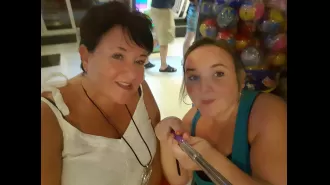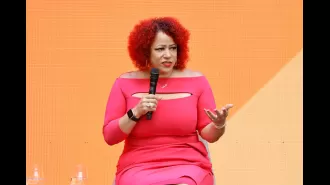12 people were killed in an attack on a football field in the Golan Heights, and here's what we know so far.
Netanyahu promises retaliation for rocket strike on Golan Heights by Hezbollah.
July 28th 2024.

Israeli Prime Minister Benjamin Netanyahu has made a bold statement, vowing that Hezbollah will face severe consequences for their recent rocket attack on Golan Heights. The attack, which took place on a football field in the Israeli-controlled territory, resulted in the tragic deaths of at least six children and teenagers. This marks the deadliest attack on Israel's northern border since the War in Gaza began last October.
In response to the attack, Prime Minister Netanyahu has decided to cut his trip to the United States short and will be returning to convene with his security cabinet. Meanwhile, Hezbollah, a militant group in Lebanon, has denied any involvement in the strike and the Lebanese government has called for an end to hostilities on all fronts.
This attack is the most severe targeting of Israeli civilians since the October 7th terrorist campaign by Hamas. While Israel's focus has mainly been on the south, this attack on Golan Heights raises concerns about the possibility of the Israel-Hamas conflict escalating into a larger regional conflict. As the dust settles from this devastating strike, here is everything you need to know about the simmering tensions along Israel's northern border, amidst the ongoing War in Gaza to the south.
Hezbollah, a Shia Islamist political party and paramilitary group in Lebanon, was established in 1982 during the Lebanese Civil War and Israel's invasion of southern Lebanon. With strong support from Iran, it has been described as a "state within a state." The group has been designated as a terrorist organization by the United States, due to its involvement in international attacks on US targets.
With a stated goal of eliminating Israel, Hezbollah is one of the most powerful and dangerous militant groups in the Middle East. In 2000, they successfully ended Israel's occupation of southern Lebanon and in 2006, they launched a month-long war after capturing two Israeli soldiers in an ambush. Although a formal ceasefire has been in place since then, sporadic clashes have occurred, especially following the outbreak of the War in Gaza last October.
Tragically, at least 12 children and teenagers were killed in the recent rocket strike, along with 20 others who were wounded. This raises the question of how Hezbollah fits into the ongoing conflict in Gaza. Both Hezbollah and Hamas are part of a network of Iranian-backed governments and militant organizations known as the "Axis of Resistance." These groups are vehemently opposed to Israel and its support from the US and other Western powers.
While Hezbollah and Iran have praised the October 7th attacks by Hamas, they have officially denied any prior knowledge of the assault and have expressed a desire to prevent the conflict from escalating further. However, tensions have remained high along Israel's northern border with Lebanon, with increasing crossfire and rocket strikes in recent weeks.
The Israeli foreign minister has stated that "we are nearing the moment in which we face an all-out war." As the situation continues to unfold, follow us for the latest updates from Metro. You can also join our community on Whatsapp for breaking news and juicy stories.
But how did the recent Golan Heights rocket strike actually unfold? The attack on a football field in Majdal Shams came after Hezbollah claimed responsibility for 10 other attacks on Israeli military posts in Golan Heights. They stated that these were in response to Israeli airstrikes on villages in southern Lebanon. Video footage from Israeli TV shows a large blast in the valley near the town, with paramedics rushing victims to nearby ambulances on stretchers.
Residents report that an airstrike siren was sounded before the rocket hit, but there was not enough time to seek shelter. The attack resulted in the tragic deaths of 12 children and teenagers, with 20 others injured. Surprisingly, Hezbollah has been quick to distance themselves from the assault, with a spokesperson stating that they "categorically deny carrying out an attack on Majdal Shams."
Israel has responded to the rocket strike with airstrikes on seven Hezbollah targets deep inside Lebanese territory. However, there have been no reported casualties from these attacks. The Israeli foreign minister has stated that "there is no doubt that Hezbollah has crossed all the red lines here, and the response will reflect that." The White House has condemned the airstrike on the football field but has not directly blamed Hezbollah, instead reaffirming their support for Israel's security.
This attack marks the highest number of Israeli civilian casualties since the October 7th terrorist campaign by Hamas. The question now is, what could happen next? This weekend's events have escalated already tense relations between Israel and Hezbollah along the border with southern Lebanon. It is not the first time that the War in Gaza has threatened to spill over, as seen in April when Israel bombed the Iranian embassy in Damascus, resulting in a fleet of missiles being sent towards Israeli territory.
It remains to be seen if the situation in Golan Heights will follow a similar path, as the United Nations urges all parties to exercise restraint and avoid a catastrophic escalation of the conflict.
In response to the attack, Prime Minister Netanyahu has decided to cut his trip to the United States short and will be returning to convene with his security cabinet. Meanwhile, Hezbollah, a militant group in Lebanon, has denied any involvement in the strike and the Lebanese government has called for an end to hostilities on all fronts.
This attack is the most severe targeting of Israeli civilians since the October 7th terrorist campaign by Hamas. While Israel's focus has mainly been on the south, this attack on Golan Heights raises concerns about the possibility of the Israel-Hamas conflict escalating into a larger regional conflict. As the dust settles from this devastating strike, here is everything you need to know about the simmering tensions along Israel's northern border, amidst the ongoing War in Gaza to the south.
Hezbollah, a Shia Islamist political party and paramilitary group in Lebanon, was established in 1982 during the Lebanese Civil War and Israel's invasion of southern Lebanon. With strong support from Iran, it has been described as a "state within a state." The group has been designated as a terrorist organization by the United States, due to its involvement in international attacks on US targets.
With a stated goal of eliminating Israel, Hezbollah is one of the most powerful and dangerous militant groups in the Middle East. In 2000, they successfully ended Israel's occupation of southern Lebanon and in 2006, they launched a month-long war after capturing two Israeli soldiers in an ambush. Although a formal ceasefire has been in place since then, sporadic clashes have occurred, especially following the outbreak of the War in Gaza last October.
Tragically, at least 12 children and teenagers were killed in the recent rocket strike, along with 20 others who were wounded. This raises the question of how Hezbollah fits into the ongoing conflict in Gaza. Both Hezbollah and Hamas are part of a network of Iranian-backed governments and militant organizations known as the "Axis of Resistance." These groups are vehemently opposed to Israel and its support from the US and other Western powers.
While Hezbollah and Iran have praised the October 7th attacks by Hamas, they have officially denied any prior knowledge of the assault and have expressed a desire to prevent the conflict from escalating further. However, tensions have remained high along Israel's northern border with Lebanon, with increasing crossfire and rocket strikes in recent weeks.
The Israeli foreign minister has stated that "we are nearing the moment in which we face an all-out war." As the situation continues to unfold, follow us for the latest updates from Metro. You can also join our community on Whatsapp for breaking news and juicy stories.
But how did the recent Golan Heights rocket strike actually unfold? The attack on a football field in Majdal Shams came after Hezbollah claimed responsibility for 10 other attacks on Israeli military posts in Golan Heights. They stated that these were in response to Israeli airstrikes on villages in southern Lebanon. Video footage from Israeli TV shows a large blast in the valley near the town, with paramedics rushing victims to nearby ambulances on stretchers.
Residents report that an airstrike siren was sounded before the rocket hit, but there was not enough time to seek shelter. The attack resulted in the tragic deaths of 12 children and teenagers, with 20 others injured. Surprisingly, Hezbollah has been quick to distance themselves from the assault, with a spokesperson stating that they "categorically deny carrying out an attack on Majdal Shams."
Israel has responded to the rocket strike with airstrikes on seven Hezbollah targets deep inside Lebanese territory. However, there have been no reported casualties from these attacks. The Israeli foreign minister has stated that "there is no doubt that Hezbollah has crossed all the red lines here, and the response will reflect that." The White House has condemned the airstrike on the football field but has not directly blamed Hezbollah, instead reaffirming their support for Israel's security.
This attack marks the highest number of Israeli civilian casualties since the October 7th terrorist campaign by Hamas. The question now is, what could happen next? This weekend's events have escalated already tense relations between Israel and Hezbollah along the border with southern Lebanon. It is not the first time that the War in Gaza has threatened to spill over, as seen in April when Israel bombed the Iranian embassy in Damascus, resulting in a fleet of missiles being sent towards Israeli territory.
It remains to be seen if the situation in Golan Heights will follow a similar path, as the United Nations urges all parties to exercise restraint and avoid a catastrophic escalation of the conflict.
[This article has been trending online recently and has been generated with AI. Your feed is customized.]
[Generative AI is experimental.]
0
0
Submit Comment





